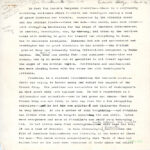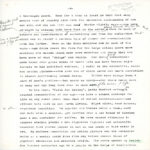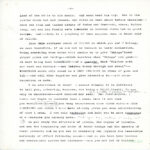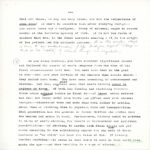Pine Mountain Settlement School
Series 07: DIRECTORS
Glyn Morris
Talks 1940
Biltmore College
Baccalaureate
Asheville, N.C.
 Biltmore College. – Architectural Record, 1920. Formerly “Overlook Castle” [Seely’s Castle] in 1920.jpg (Public Domain https://commons.wikimedia.org/wiki/File:Overlook_Castle_in_1920.jpg?uselang=en#Licensing)
Biltmore College. – Architectural Record, 1920. Formerly “Overlook Castle” [Seely’s Castle] in 1920.jpg (Public Domain https://commons.wikimedia.org/wiki/File:Overlook_Castle_in_1920.jpg?uselang=en#Licensing)
TAGS: Glyn Morris, talks, Asheville, NC, Biltmore College, 1940, UNCA, college graduations, Junior colleges, North Carolina,
GLYN MORRIS Talks – 1940 Asheville Biltmore College Baccalaureate
In June of 1941, Morris was having serious discussions with the Board at Pine Mountain Settlement School regarding his tenure at the institution and his need to join the war effort. His work in education had expanded regionally and was well known. For a brief time he served on the Board of Trustees of Biltmore College, the predecessor of Asheville Biltmore College and later the University oof North Carolina when it moved off the mountain and abandoned the regal home of the early college seen below.
This address was made during the early years of WWII when Morris was torn between serving as an Army Chaplain or remaining at Pine Mountain Settlement School as Director. His Indecision and his deep personal turmoil in making the difficult decision t0 enlist as a Chaplain is everywhere evident in this Baccalaureate Address. It is also a caution to students who would soon be caught up in the turmoil of war and forced to face their world ‘s destiny and their own personal destiny.
Address Given by GLYN MORRIS
1940 BILTMORE COLLEGE BACCALAUREATE
ASHEVILLE, NC
Transcription
In Carl Van Dorn’s Benjamin Franklin there is a profoundly arresting statement about Franklin and Washington during a time of great stress and trouble. Separated by the Atlantic Ocean and the British fleet — these two men — who hardly know each other — were struggling heroically for the cause of American independence. In America, Washington, who had taken up the American cause with nothing to gain for himself and everything to lose, was in desperate straits. Bergoyne had not yet surrendered and Washington had no great victories to his credit., The British general. Howe was leisurely taking Philadelphia unopposed by Washington. The American Army was poorly fed and equipped. Desertion was common and by no means was it qualified to pit itself against the might of the British Empire. Politicians and unprincipled men were playing havoc with the cause and with Washington’s patience.
[Benjamin] Franklin, as a diplomat representing the American cause in Paris was trying to borrow money and enlist the support of the French King. His position. was comparable to that of Washington’s in that great odds were against him. He had a reputation as a philosopher and a scientist, and he had grace and charm. But the French King was not ready to take any risk for a few struggling Colonists. He had his own political and diplomatic fences to keep intact. It was a matter of cold bargaining and frank. and Franklin had little with. which to bargain accepting his own skill. Spies were everywhere, and some of Franklin’s own staff were betraying him. he had. little news from Washington. Months between shipments. and what came was bad. It was a time of despair. In this discouraging and desperate hour when the fate of American independence was literally in the hands of these two men — Van Dorn writes prophetically that “both of them had fallen back on the last deep resources of their minds and wills.”
p. 2
THE LAST DEEP RESOURCES, What they were can only be implied. The important fact is that there were deep resources on which, in the hour of peril, they could rely. It is a striking fact. When we realized that the fate of America was actually in the hands of these two men — And in the last analysis.— On the resources locked deep within themselves.
At the risk of being misunderstood or sounding trite, because this sort of statement. is always made by each generation to the succeeding one, I say that this is a time, too, when we need specially to have inner resources. “The good old days.” — As it were — are gone. In numerous. and subtle ways we are affected by a world in trouble. True.— There must always be conflict, – For this is the stuff which is basic to life.– , But when the balance is disturbed, – As it is now.– there is more than the usual trouble. Two most devastating wars in history are a part of our lifetime. Also, this is a day of. speed and the like of which man never dreamed. While 100 years ago, it took Andrew Jackson, a president of the U. S period. Two months to travel from his home in Nashville. To Washington.— he could today., if necessary, order a fast army plane and make the journey in just three hours. This is the age of Science and mass production. Our government plans to make 50,000 airplanes a year And this production is proportionately small. Compared. To the production of automobiles. Rightly, we can call this the age of speed — — or the age of science.— But I think we should not be far off if we called it. — the age of THINGS (material).
Much has gone out of Man’s life with the invention of machines — Have relieved man of much drudgery, only, to place man under another kind of spiritual drudgery. Like every good. — Machines and things are.
p. 3
A two edged sword. gone for a time at least. is much that many people knew of country life with its wholesome combination of man and soil and sky and rain and sun. Goethe rightly says — One gets strength by walking with bare feet on the Earth despite evils of exposed illnesses. Many scarcely know the [?] Gone. Is much of leisure and conversation or? sociability and time for reflection that was a normal part of life which was in itself a certain type of prayer and communication with the Divine. On the farm, machines now do much of the work – And folks leave the farm for the large cities where more machines are masked, which make more machines and where they can have more of what “things” can supply . And three good inventions Have taken over great areas of Man’s life and have become major threats to his spiritual welfare. I refer to the automobile., radio., and motion picture — The last two of which serve out man’s recreation in almost spiritually lethal doses. THINGS Have always been a part of Man’s problem — But never as today.— For there never were so many, nor did they take over so much of the areas of life.
In his book, “Faith for Living”, Louis Mumford writes on a pointed. denunciation of our age — We have a common contempt for life on any other level than that of animal satisfaction — And without this, life is not worth living. Night clubs, road houses, and other organized inanities. We suntan our bodies under a lamp, curl our hair with a machine, get excited. over a new brand of chewing gum., a new container for coffee. We have canned vitamins to achieve eternal youth., a new cigarette lighter, and scientific research that proves pepper is hot in the mouth, or that water is wet. By endless repetition, the motion picture and the newspaper build up a mental world free from any values except those of physical sensation and material wealth. The words spoken by Isaiah the Prophet centuries ago to a people on the verge of destruction
p, 4
— For their sins-— takes on new meaning today — “Their land is full of idols; They worship the work of their own hands., that which their own fingers have made.” (Isaiah 2:8)
We pride ourselves on being. “scientific” and. “factual” — For nothing exists that we cannot see with our eye or touch with our hands or prove statistically.. And man’s spirit is throttled. For he has not the time, nor the inclination to see visions or dream great dreams. The unseen — the spiritual — That which gives meaning to what is seen — is no longer real to many. What is seen and touched is simply not enough. We showed [ ? ] pause to be fast that the death of each civilization took place at about the period when people enjoyed the greatest comparative amount of physical luxury? Even now — We can produce untold quantities of THINGS — So that a poor man can have conveniences that kings never dreamed of — The world is collapsing before our eyes. Is it that “THINGS” have gotten ahead of man’s spirit?
The experience of Abraham’s nephew Lot is symbolic of what is happening and (dangerously enough, may continue to happen.) You recall the story — After being together many years. — These two men decided to park company, peacefully and as friends, because their herdsmen were constantly quarreling over pasture land. Both had great flocks — — And so, standing together overlooking the land.- they selected. the part to which they would go. Abraham gently. — turned to his nephew and said- ” – you choose first.– and after you have chosen, I’ll take what is left.“. And Lot — Who wasn’t so much a gentleman, turned his back on all his uncle had done for him, — ignoring the opportunity to be gracious to the older man.- Decided he would take the rich, fertile plains., leaving the less fertile
p. 5
land of the hills to his uncle. And each went his way. but in the plains which lot had chosen. , and which he knew about before choosing.— Were the rich. and wicked cities. Of Sodom and Gomorrah., where, before long, Lot and his family were involved in trouble, which led to great sorrow. And — This is a prophecy of what happens when we think only of THINGS.
Into this confused world of things to which you and I belong, we must therefore, if we are not to succumb to their domination. —, bring something else which will enable us to give THINGS their proper place and rating — which survives when THINGS are gone — We must bring that SOMETHING of a quality that “neither moth nor rust can corrupt — nor theives break through and steal” —SOMETHING which will stand as a DEEP RESOURCE in times of good and ill — and will bind together and give direction to — all other resources we have.
You ask — What is this? I answer frankly, it is difficult to tell you, primarily, because, not being a THING itself, it can only be understood.— not touched nor seen. It is a matter of feeling and intuition. But, furthermore, I could not begin to indicate what I mean, were it not that you must already have had many experiences here which nurture this something? And which I hope have already given you some understanding of what I mean. I. can only emphasize and help you be more conscious of a resource you already have — that you may. nurture and make real.
As you study the structure of plants, the organs of animals, and see the complexity and order of their design and the symmetry of their pattern ; and as you see in chemistry and physics the reasonable certainty of effect following cause — and as you look into heavens and contemplate system in distance — are you not led to believe
p. 6
That all these, to say the very least, are but the reflections. of some idea? It can’t be possible — That after studying design. You could leave out a designer. Study of science, ought to create wonder at the infinite mystery of life. it is not the facts of silence. – That are, in the final analysis amazing.— It is the origin of the pattern and its ultimate purpose. It is this wonder which is basic to our understanding of life that goes beyond “THINGS”. That is the “reality” of such things as symbols.
As you study history, you have examined. significant events and followed the course of man’s progress from the time of his first consciousness till now. — You have seen that in the past as now?- Men were more certain of the answers than events showed. They should have been. You have seen something of achievement. and mistake. but two, you must have seen that man’s history could be written in terms of both his finding and resisting — TRUTH — truth which existed [exiated?] before he found it — of ideas which existed but were known until Some brave and gifted soul with unusual insight — Discovered them and made them real, either by writing about them or clothing them in physical form and demonstration. each generation. Has its greater or lesser Galileo who probes into the unseen and makes it real. Furthermore, history could be written. – In terms of Man’s striving for ideals of Brotherhood and spiritual possibilities.– of striving to clothe. With fresh ideals, not yet known. excepting To the spiritually minded.” Few who made it their business to “be still” and hear the voice of God. — Teaches anything — it warns us that there is more to this world than meets the eye — and that humility is a sign of wisdom.
p. 7
And lastly — in this Chapel and in all places where you are thoughtful and reflective — which nurture communion with the unseen — Had experienced many times that “SOMETHING” which was more than we could see or touch? In the open between these ageless hills have you not felt kinship with the one [Charles Hanson Towne] who said —
I need not shout my faith. Thrice eloquent
Are quiet trees and the green listening sod;
Hushed are the stars, whose power is never spent;
The hills are mute: yet how they speak of God!
Charles Hanson Towne*
This college was founded among. other things, because it is a Christian college, to increase your sensitivity to the unseen. It should, And I’m sure it does in many subtle ways, as a byproduct, as it were, a byproduct more valuable than the product itself., give you some consciousness that there is more to life than what we see or touch and can we not say —
“I see that back of everything there lies
This wonderous, shining essence, finer far
Than all the gathered gold of Western Skies
More lasting still than suns or planets are”Angela Morgan
(Though) by — Nature of life itself. You will continue to seek for more tangible evidence of the unseen. And like. The appreciation of art or music, This must be cultivated for most. of us — It will only come, only as it has come to you here, indirectly. Understanding of the — unseen, is, in many ways, an art.- and demands the same devotion and sensitivity. There is a world that we cannot see. — that we can only feel — — for as the poet says,
“… mere symbols we perceive.—
— The dying beauty.
The partial truth
that few can comprehend..”
This understanding of the unseen. is a deep resource. You have others, — to be sure.— discipline -, ability to work, experience in living with others.– . but without this resource, the others will lack their power. as this becomes more real to you — This feeling for the
p. 8
world behind what we see and feel — It will lead to faith.— In fact, it is faith, faith that behind all we see is GOD Who knows and understands, This is a DEEP RESOURCE you may fall upon when you are tempted to be dishonorable. When you establish your own home in a world of THINGS — that often don’t make sense — It is indispensable that you. are you are ever conscious that underneath are the everlasting arms.
Our father in heaven. — Make increasingly real to us, we pray, the unseen world, so that when the storms of life come, they may pass over us, leaving undisturbed the peace within our hearts.
*Charles Hanson Towne’s poem “Silence” is published in full. [Educational purposes]
GALLERY – GLYN MORRIS TALK 1940 BILTMORE COLLEGE BACCALAUREATE
- morris_glyn_1940_asheville_001
- morris_glyn_1940_asheville_002
- morris_glyn_1940_asheville_003
- morris_glyn_1940_asheville_004
- morris_glyn_1940_asheville_005
- morris_glyn_1940_asheville_006
- morris_glyn_1940_asheville_007
- morris_glyn_1940_asheville_008
- morris_glyn_1940_asheville_009










